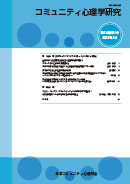Volume 24, Issue 1
Displaying 1-6 of 6 articles from this issue
- |<
- <
- 1
- >
- >|
Special Issue
Multicultural Counseling and Community Psychology
-
2020Volume 24Issue 1 Pages 1-2
Published: September 30, 2020
Released on J-STAGE: September 30, 2021
Download PDF (209K) -
2020Volume 24Issue 1 Pages 3-14
Published: September 30, 2020
Released on J-STAGE: September 30, 2021
Download PDF (460K) -
2020Volume 24Issue 1 Pages 15-26
Published: September 30, 2020
Released on J-STAGE: September 30, 2021
Download PDF (583K) -
2020Volume 24Issue 1 Pages 27-40
Published: September 30, 2020
Released on J-STAGE: September 30, 2021
Download PDF (428K) -
2020Volume 24Issue 1 Pages 41-52
Published: September 30, 2020
Released on J-STAGE: September 30, 2021
Download PDF (493K)
Original Article
-
2020Volume 24Issue 1 Pages 53-68
Published: September 30, 2020
Released on J-STAGE: September 30, 2021
Download PDF (3145K)
- |<
- <
- 1
- >
- >|
